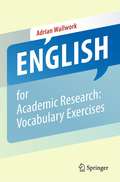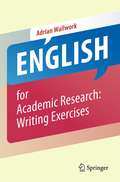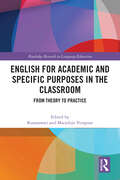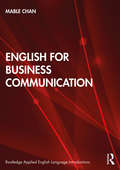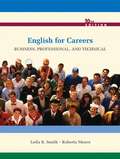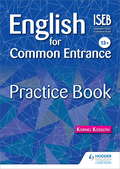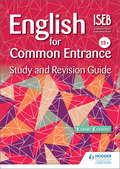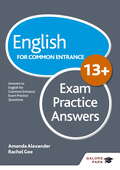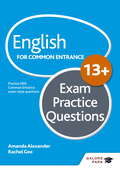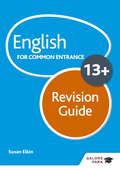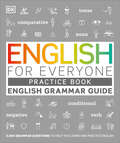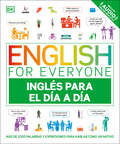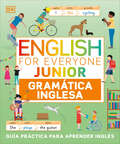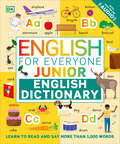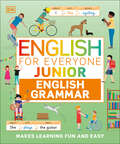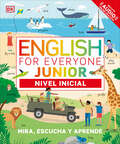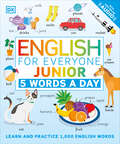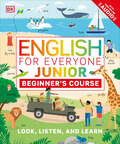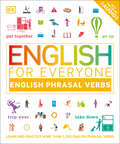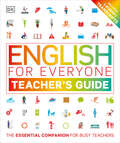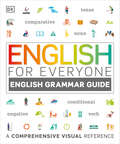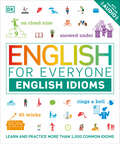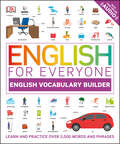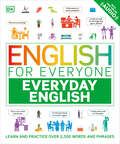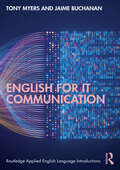- Table View
- List View
English for Academic Research: Vocabulary Exercises
by Adrian WallworkThis book is based on a study of referees' reports and letters from journal editors on reasons why papers written by non-native researchers are rejected due to problems with English (long sentences, redundancy, poor structure etc). It draws on English-related errors from around 5000 papers written by non-native authors, around 3000 emails, 500 abstracts by PhD students, and over 1000 hours of teaching researchers how to write and present research papers. The exercises are organized into nine chapters on: adjectives and adverbs (e.g. actual vs current, different vs several, continually vs continuously), link words (e.g. on the contrary vs on the other hand, despite vs nevertheless), nouns (e.g. danger vs hazard, measure vs measurement), prepositions (e.g. among vs between, in vs into, with vs within), verbs (e.g. check vs control, compose vs comprise, arise vs raise, exclude vs rule out), false friends and synonyms, spelling, useful phrases, emails Nearly all exercises require no actual writing but simply choosing between various options, thus facilitating self-study, e-reading and rapid progress. The exercises can also be integrated into English for Academic Purposes (EAP) and English for Special Purposes (ESP) courses at universities and research institutes. The book can be used in conjunction with the other exercise books in the series: English for Academic Research: Writing Exercises English for Academic Research: Grammar Exercises
English for Academic Research: Writing Exercises
by Adrian WallworkThis book is based on a study of referees' reports and letters from journal editors on reasons why papers written by non-native researchers are rejected due to problems with English (long sentences, redundancy, poor structure etc). It draws on English-related errors from around 5000 papers written by non-native authors, around 3000 emails, 500 abstracts by PhD students, and over 1000 hours of teaching researchers how to write and present research papers. The exercises are organized into ten chapters on: punctuation and spellingword orderwriting short sentences and paragraphslink words - connecting phrases and sentences togetherbeing concise and removing redundancyambiguity and political correctnessparaphrasing and avoiding plagiarismdefining, comparing, evaluating and highlightinganticipating possible objections, indicating level of certainty, discussion limitations, hedging, future workwriting each section of a paperSome exercises require no actual writing but simply choosing between various options, thus facilitating self-study, e-reading and rapid progress. In those exercises where extended writing is required, model answers are given. Exercise types are repeated for different contexts, for example the importance of being concise is tested for use in papers, referees' reports, and emails of various types. Such repetition of similar types of exercises is designed to facilitate revision. The exercises can also be integrated into English for Academic Purposes (EAP) and English for Special Purposes (ESP) courses at universities and research institutes. The book can be used in conjunction with the other exercise books in the series and is cross-referenced to: English for Research: Usage, Style, and Grammar English for Writing Research Papers
English for Academic and Specific Purposes in the Classroom: From Theory to Practice (Routledge Research in Language Education)
by Rosmawati Marjolijn VerspoorThis volume showcases curriculum designs, instructional strategies, classroom challenges, and assessment practices in courses around the world introduced to meet the demand for English language skills for academic (EAP) or specific purposes (ESP) in higher education settings. Particularly in English as a medium of instruction (EMI) institutions, the courses are frequently part of the curriculum, regardless of discipline or specialization. Given the prevalence of such courses, it is important to understand how they are implemented.Many theories and models have inspired and underpinned these courses, including genre-based instruction, Writing in the Disciplines, Systemic Functional Linguistics, the academic literacies model, and translanguaging. Often, these are combined with various pedagogical approaches such as constructive alignment, flipped learning, learning-oriented assessment, Galperin’s theory of Systematic Formation of Mental Actions (SFMA), the study skills models, pedagogical cultural-historical activity theory, and the TESOL teaching-learning cycle. This book showcases how these are implemented in EAP/ESP classrooms.This volume gives a voice to instructors whose experience in real-life classrooms is invaluable to inform research and policies as well as to refine theories. It serves as a venue for conversation among the community of practitioners and researchers of applied linguistics and language teaching.
English for Business Communication (Routledge Applied English Language Introductions)
by Mable ChanThis textbook provides a comprehensive introduction for students and professionals who are studying English for business or workplace communication and covers both spoken and written English. Based on up-to-date research in business communication and incorporating an international range of real-world authentic texts, this book deals with the realities of communication in business today. Key features of this book include: use of English in social media that reflects recent trends in business communication; coverage of the concept of communicative competence; analysis of email communication; introduction to informal English and English for socialisation as well as goodwill messages, such as thank you or appreciation messages, which are a part of everyday interaction in the workplace; examination of persuasive messages and ways to understand such messages; an e-resources website that includes authentic examples of different workplace genres and a reference section covering relevant research studies and weblinks for readers to better understand the topics covered in each chapter. This book goes beyond the traditional coverage of business English to provide a broad and practical textbook for those studying English in a workplace setting.
English for Careers: Business, Professional, and Technical (10th Edition)
by Leila R. Smith Roberta MooreWith a focus on mastering the fundamentals, English for Careers 10th Edition is designed to keep pace with changing student populations and current workplace trends. It helps students acquire fluency in Standard English and understand the basic principles of grammar, punctuation and writing. It focuses on the "real-world" English skills needed to get a good job, hold a job, and advance in a career. This edition features a variety of in-text and online exercises and more.
English for Common Entrance 13+ Practice Book
by Kornel KossuthThis book of practice questions and mock exam papers gives students the practice they need as they prepare for the new ISEB Common Entrance in English 13+ exam. - Reinforces the skills and knowledge students need to tackle exam questions with confidence - Includes five complete mock exam papers that sharpen students' exam technique - Targets the essential skills students need to master in order to do well in the exam
English for Common Entrance Study and Revision Guide
by Kornel KossuthSucceed in the exam with this revision guide, designed specifically for the brand new Common Entrance English syllabus. It breaks down the content into manageable and straightforward chunks with easy-to-use, step-by-step instructions that should take away the fear of CE and guide you through all aspects of the exam.- Gives you step-by-step guidance on how to recognise various types of comprehension questions and answer them- Shows you how to write creatively as well as for a purpose for the section B questions- Reinforces and consolidates learning with tips, guidance and exercises throughout - Makes it easy to navigate and find specific revision topics with short, clear sections
English for Common Entrance at 13+ Exam Practice Answers (for the June 2022 exams)
by Amanda Alexander Rachel GeePlease note, this resource is suitable for the exams up to June 2022. New revision resources will be available from Spring 2022 for the exams from November 2022.Exam Board: ISEBLevel: 13+Subject: EnglishFirst Teaching: September 2012First Exam: Autumn 2013This book contains answers to all the questions in English for Common Entrance at 13+ Exam Practice Questions, accompanied with extensive advice and guidance to help achieve top marks.- Endorsed by Independent School Examination Board (ISEB)- Clean, clear layout for easy marking- Identifies areas requiring further attentionAlso available in the English for Common Entrance at 13+ range:- English for Common Entrance at 13+ Revision Guide (ISBN: 9781471875021)- English for Common Entrance at 13+ Exam Practice Questions (ISBN: 9781471868962)
English for Common Entrance at 13+ Exam Practice Questions (for the June 2022 exams)
by Amanda Alexander Rachel GeePlease note, this resource is suitable for the exams up to June 2022. New revision resources will be available from Spring 2022 for the exams from November 2022.Exam Board: ISEBLevel: 13+Subject: EnglishFirst Teaching: September 2012First Exam: Autumn 2013This book provides a wealth of comprehensive practice exercises in the format of the ISEB Common Entrance exam at both Level 1 and 2. A varied selection of texts and poems has been selected to help pupils for the Reading sections of the exam, and there is a large bank of exercises for the Writing sections.Exam Practice Answers is available to accompany this title.- Endorsed by Independent School Examination Board (ISEB)- Features rigorous and realistic exam-style questions in the style of the ISEB Common Entrance exam - Provides extensive practice and guidance to help pupils achieve top marksAlso available in the English for Common Entrance at 13+ range:- English for Common Entrance 13+ Revision Guide (ISBN: 9781471875021)- English for Common Entrance Exam Practice Answers (ISBN: 9781471868993)
English for Common Entrance at 13+ Revision Guide (for the June 2022 exams)
by Susan ElkinPlease note, this resource is suitable for the exams up to June 2022. New revision resources will be available from Spring 2022 for the exams from November 2022.Exam Board: ISEBLevel: 13+Subject: EnglishFirst Teaching: September 2012First Exam: Autumn 2013An essential revision resource for pupils working towards English Common Entrance at 13+. A full colour resource which holds the most up-to-date material and exam techniques. Throughout the book you will find revision tips and practical guidance on how to achieve top grades, as well as self- assessment questions to help pupils identify areas that need further study.- Endorsed by Independent School Examination Board (ISEB)- Consolidates all the key information required for Common Entrance at 13+- Provides practical guidance on improving written answers and exam technique- Includes advice on creative writing and how to write for practical purposes
English for Everyone Grammar Guide Practice Book (DK English for Everyone)
by DKPuzzled by past tenses? Confused be comparatives? The English for Everyone Grammar Practice Book is packed with practice questions and activities to help you learn essential English grammar through visual and engaging content. The Grammar Practice Book helps you to develop your practical English through a variety of exercises and examples that will expand your understanding of grammar and punctuation in use. When used alongside our Grammar Guide, which introduces essential grammar rules through visual teaching methods, this grammar book is ideal for English test preparations or ESL lesson plans. About English For EveryoneEnglish for Everyone is a series of guides and practice books that support English learning for teenagers and adults from a beginner level, to intermediate, and advanced practical English. Offering an easy-to-follow format that offers guidance for both teaching English as a foreign language, and a self-study approach with resources available to improve English speaking, reading, and writing.Whether you are looking for ESL teaching resources, or a structured program for adults to learn English as a second language, the English for Everyone Series provides: - Sample language examples: New language topics are introduced in context using clear, illustrated, and color-coded explanations- Supporting audio: Extensive English-speaking audio materials integrated into every unit, giving vital oral and listening practice. (All supplementary audio is available on the DK English for Everyone website and IOS/Android App).- Quick referencing: Easy-to-follow units, mirrored in both the Course and Practice Books for easy referencing and teaching- Sentence formation guides: Visual break downs of essential English grammar for beginners, showing learners how to recreate even complex English sentences- Visual English vocabulary cues: Lists of useful English words and common phrases with visual aids are available throughout the book- Personalised learning: Write-on lines encourage ESL learners to write their prompts and translations The English for Everyone Series covers the skills and topics required for all major global English-language exams and reference frameworks including: - CEFR- TOEFL- IELTS- TOEIC
English for Everyone Inglés para el día a día (DK English for Everyone)
by DK¡Lleva tus habilidades de comunicación en inglés a otro nivel! Si necesitas aprender inglés para trabajar, estudiar, viajar o incluso mudarte, este libro será tu mayor aliado.English for Everyone: Everyday English te ayuda a expresarte en inglés en tu día a día con confianza. Aprende a comunicarte en diferentes escenarios del mundo real, desde actividades como ir al supermercado, pedir comida a domicilio o concertar citas, hasta conversaciones clave como consolar a alguien o lidiar con un conflicto.En las páginas de este libro de inglés para jóvenes y adultos, encontrarás: Más de 1500 frases y expresiones útiles para practicar tu inglés.Cada unidad incluye diálogos realistas y fáciles de memorizar.Ejercicios prácticos para reforzar el vocabulario y las frases que has aprendido en cada tema.Atractivas imágenes que acompañan los diferentes diálogos.Vídeos y audios de hablantes de inglés nativos, disponibles en nuestra página web y aplicación gratuitas.Una excelente herramienta de apoyo tanto para estudiantes que están preparando sus exámenes oficiales TOEFL, IELTS y TOEIC, como para viajeros o profesores. Mejora tu inglés oral de forma amena y divertida y enfréntate a situaciones cotidianas, como charlas en la oficina o reservas de viajes, más fácilmente. La colección English for Everyone de DK es una forma fácil y divertida de aprender inglés. Con audios de apoyo e innovadores ejercicios que cubren todos los aspectos clave del idioma, estos libros ilustrados sustituyen complicadas explicaciones por imágenes y gráficos claros, para aprender visualmente y que la gramática y el vocabulario resulten fáciles de recordar. ¡Aprender inglés no ha sido nunca tan fácil!Speak English with confidence in a wide range of everyday situations, from making small talk to booking a trip abroad. With more than 1,500 of the most useful phrases and common expressions, English for Everyone: Everyday English gives you all the English conversation skills you need to get by in the real world.This engaging and accessible book covers a wide range of real-life topics and scenarios – from everyday activities, such as going to the supermarket and making appointments, to key communication skills, such as comforting someone and dealing with conflict. You’ll learn how to welcome visitors, ask for directions, give a presentation at work, find somewhere to live, order a meal out, and much, much more.Each short unit uses memorable, true-to-life dialogues to introduce a new topic, followed by practice exercises to reinforce the new words and phrases that you have learned. The dialogues are accompanied by attractive illustrations and brought to life by animated videos and audio featuring speakers of English as a first language, all available on the free English for Everyone website and app. Whether you need to learn English for work, study, travel, or relocation, English for Everyone: Everyday English is the perfect companion to help you take your English skills to the next level.
English for Everyone Junior Gramática inglesa (DK English for Everyone Junior)
by DKAyuda a los niños a aprender las reglas de la gramática inglesa con este divertido libro ilustrado.Esta guía de gramática incluye ilustraciones atractivas, diseños claros y explicaciones sencillas de las reglas del inglés redactadas de una manera fácil de entender para niños de 5 a 9 años. Cada regla gramatical va acompañada de una explicación sencilla que servirá tanto a padres como a profesores a la hora de ofrecerles apoyo a los niños. Además, muestra a través de ilustraciones escenarios del día a día para que los pequeños estudiantes vean la aplicabilidad del contenido.En su interior, encontrarás:-Gramática básica para niños que comenzaron a estudiar inglés recientemente, como los tiempos verbales, oraciones afirmativas, negativas o interrogativas, verbos modales, pronombres y adjetivos.-Las estructuras gramaticales y lingüísticas que necesitan aprender para la preparación de los exámenes Cambridge Young Learners o los grados 1, 2 y 3 de los exámenes Trinity GESE-Módulos cortos, explicaciones sencillas y bonitas ilustraciones que hacen que la gramática sea fácil de entender.El enfoque visual y dinámico de English for Everyone Junior: English Grammar sin duda cautivará a los estudiantes más jóvenes, ¡y se convertirá en su compañero de estudio ideal! Acompañales a descubrir el mundo que los rodea, a hablar sobre lo que les gusta y lo que no, a hacer preguntas, a formar oraciones negativas ¡y mucho másLa colección English for Everyone de DK es una forma fácil y divertida de aprender inglés. Con audios de apoyo e innovadores ejercicios que cubren todos los aspectos clave del idioma, estos libros ilustrados sustituyen complicadas explicaciones por imágenes y gráficos claros, para aprender visualmente y que la gramática y el vocabulario resulten fáciles de recordar. ¡Aprender inglés no ha sido nunca tan fácil!Understand the rules of English grammar with this fun, fully illustrated reference book for children aged 5–9 who are studying English as a foreign language. This ultimate grammar guide features attractive illustrations, clear layouts, and simple explanations that present and explain the rules of the English language in a way that is easy for younger learners to understand and digest. The grammar covered in this reference guide will help children aged 5-9 to describe the world around them, talk about their likes and dislikes, ask questions, and form negative sentences. Grammar is first presented in a realistic scene, and then broken down into bite-size chunks that are easy to understand and digest. Each grammar rule is accompanied by a simple explanation that can be used by the teacher or parent. This grammar book for children offers: -Material that’s ideal for children who have recently begun to study English, covering essential grammar including present, past, and future tenses, negatives, questions, modal verbs, pronouns, and adjectives.-The grammar and language structures required for the Cambridge Young Learners exams or Grades 1–3 of the Trinity GESE exams.-Bite-sized modules that make grammar easy to understand, clear and simple explanations, and beautiful illustrations.Young learners of English will be captivated and engaged by the dynamic visual approach that sets English for Everyone Junior: English Grammar apart from other language materials for children. This Engish grammar guide is the ideal companion for children who have recently begun to study English, including those preparing for the Cambridge Young Learners exams or Grades 1–3 of the Trinity GESE exams.
English for Everyone Junior English Dictionary: Learn to Read and Say 1,000 Words (DK English for Everyone Junior)
by DKLearn over 1,000 English words and master English as a second language!An English dictionary perfect for children ages 6-9 who are starting to learn English as a second or foreign language. The dictionary includes an app that helps students with pronunciation and makes learning a new language fun and interactive.This English vocabulary book contains everything you need to understand the most used words in English in an engaging way: • 1,000 words are arranged A–Z and taught through beautiful illustrations. • Entertaining songs help to reinforce the learning and make it fun. • The audio for all vocabulary and songs in the book are available online and via an app. • A reference section at the back covers broader themes such as numbers, opposites, and time Learning new vocabulary is as easy as ABC! Every word in this dictionary is beautifully illustrated and arranged from A to Z to help your child understand the alphabet, and to encourage word recognition and English reading. Each section begins with the upper and lower-case versions of the letters and helps children understand their shape and form. Charming drawings put each word into context, and entertaining songs to sing along to make the process of learning easy and exciting for young children.English For Everyone: Junior English Dictionary is part of the best-selling English for Everyone series from DK. It&’s the perfect English word guide for young children who are starting to learn English or for teachers who specialize in English Language Teaching (ELT).
English for Everyone Junior English Grammar: A Simple Visual Guide to English (DK English for Everyone Junior)
by DKUnderstand the rules of English grammar with this fun, fully illustrated reference book for children aged 5–9 who are studying English as a foreign language. This ultimate grammar guide features attractive illustrations, clear layouts, and simple explanations that present and explain the rules of the English language in a way that is easy for younger learners to understand and digest. The grammar covered in this reference guide will help children aged 5-9 to describe the world around them, talk about their likes and dislikes, ask questions, and form negative sentences. Grammar is first presented in a realistic scene, and then broken down into bite-size chunks that are easy to understand and digest. Each grammar rule is accompanied by a simple explanation that can be used by the teacher or parent. This grammar book for children offers: - Material that&’s ideal for children who have recently begun to study English, covering essential grammar including present, past, and future tenses, negatives, questions, modal verbs, pronouns, and adjectives.- The grammar and language structures required for the Cambridge Young Learners exams or Grades 1–3 of the Trinity GESE exams.- Bite-sized modules that make grammar easy to understand, clear and simple explanations, and beautiful illustrations.Young learners of English will be captivated and engaged by the dynamic visual approach that sets English for Everyone Junior: English Grammar apart from other language materials for children. This Engish grammar guide is the ideal companion for children who have recently begun to study English, including those preparing for the Cambridge Young Learners exams or Grades 1–3 of the Trinity GESE exams. More in the seriesIf you like English for Everyone Junior: English Grammar then why not try English for Everyone Junior: My First English Dictionary, as part of the widely successful English for Everyone Junior Series, which have sold more than two million copies in over 90 countries.
English for Everyone Junior Nivel inicial (DK English for Everyone Junior)
by DK¡Mira, escucha y aprende inglés con este divertido libro para principiantes! Con English for Everyone Junior: Nivel inicial, ¡no necesitas tener conocimientos previos de inglés para empezar a dominar el idioma! Este libro para niños de 6 a 10 años se convertirá en el compañero ideal de tus hijos para aprender inglés, con gramática y vocabulario de temas esenciales como la familia, el colegio, los animales, la casa, el cuerpo humano, la comida, la ropa ¡y mucho más! Repleto de ejercicios sencillos y audios que te permitirán hablar y leer más de 500 palabras en tiempo récord.Perfecto tanto para estudiar en casa como en el colegio.Con explicaciones de reglas gramaticales inglesas acompañadas de ejemplos claros de cuándo se usan.Incluye una guía de escritura a mano y un glosario de los términos lingüísticos utilizados a lo largo del libro.Un recurso ideal que te proporcionará todo el apoyo que necesitas para aprender inglés desde cero, ya que te guía por los conceptos básicos del idioma y te ayuda a usar y comprender el inglés básico con claridad y confianza.La colección English for Everyone de DK es una forma fácil y divertida de aprender inglés. Con audios de apoyo e innovadores ejercicios que cubren todos los aspectos clave del idioma, estos libros ilustrados reemplazan las complicadas y aburridas explicaciones con imágenes divertidas y gráficos claros, para aprender visualmente y que la gramática y el vocabulario resulten fáciles de recordar. ¡Aprender inglés no ha sido nunca tan fácil!Learn English with this fun course for complete beginners. Simple exercises and lively audio will have you speaking and reading more than 500 words in no time!The perfect introduction to English vocabulary and grammar, English for Everyone Junior: Beginner's Course provides children aged 6-9 with the support they need as they take the first steps towards learning English as a foreign language.Equally effective for home study or the classroom, this carefully leveled English-language course assumes no previous knowledge of English. It takes children through the basics of the language, helping them use and understand elementary English clearly and confidently.Vocabulary is taught through attractive illustrations and reinforced with audio resources. Each language/grammar point is explained in a dedicated panel, accompanied by clear examples of how it's used, and reinforced by exercises. At the back, there is a handwriting guide, grammar overview, and a glossary of language terms used throughout the book.Building on the worldwide success of the English for Everyone series, the Junior Beginner's Course contains everything a child needs to acquire a firm grasp of English in a fun and interactive way.
English for Everyone Junior: 5 Words a Day (DK 5-Words a Day)
by DKThis beautifully illustrated vocabulary book for children introduces your child to the essentials of English vocabularyDiscover the perfect introduction to English for children aged 6-9 with this fantastic guide to English, which teaches and tests five new words each day, for five days a week, over one year. This language study guide contains everything a child needs to acquire a firm grasp of English in a fun and interactive way and... • Teaches over 1,000 commonly used English words • Beautiful illustrations accompany stimulating and entertaining activities • Follows the same visual methodology as the rest of the English for Everyone series • Structured in clear sections based around a theme (e.g. toys, food and drink, school) From colors, numbers, fruits, and toys to animals, sports, clothes, and weather, just about every subject in the English language is covered in eye-catching, illustrative detail. Incredibly easy to use, it includes daily &“test yourself&” activities with cleverly designed flaps that hide the words your child has just learned and helps fix those words in their memory. 5 New Words a DayThis unique study aid encourages parents, teachers, and children to work together as a team to grasp all aspects of the English language, including grammar, punctuation, and spelling. It&’s suitable as a workbook for children preparing for the Cambridge English and Trinity GESE exams. It&’s also a great English teaching resource for anyone teaching English lessons for kids. Packed full of fun and useful everyday vocabulary, this visual reference book will capture the imagination of little learners and encourage a love for learning their first English words. The book presents your child with 5 new words to learn and practice each day for four days, then tests these words through a variety of interactive exercises on day five. Over the course of one year, your child will build up a vocabulary of more than 1000 English words.Complete the Series:The English for Everyone series is a wonderful study guide for children to take their first steps towards learning English as a foreign language. Practice phrasal verbs and understand their meanings in English For Everyone: Phrasal Verbs.
English for Everyone Junior: Beginner's Course (DK English for Everyone Junior)
by DKLearn English with this fun course for complete beginners. Simple exercises and lively audio will have you speaking and reading more than 500 words in no time! PLEASE NOTE - this is a replica of the print book and you will need paper and a pen or pencil to complete the exercises.The perfect introduction to English vocabulary and grammar, English for Everyone Junior: Beginner's Course provides children aged 6-9 with the support they need as they take the first steps towards learning English as a foreign language.Equally effective for home study or the classroom, this carefully leveled English-language course assumes no previous knowledge of English. It takes children through the basics of the language, helping them use and understand elementary English clearly and confidently.Vocabulary is taught through attractive illustrations and reinforced with audio resources. Each language/grammar point is explained in a dedicated panel, accompanied by clear examples of how it's used, and reinforced by exercises. At the back, there is a handwriting guide, grammar overview, and a glossary of language terms used throughout the book.Building on the worldwide success of the English for Everyone series, the Junior Beginner's Course contains everything a child needs to acquire a firm grasp of English in a fun and interactive way.
English for Everyone Phrasal Verbs (DK English for Everyone)
by DKFeeling put off by phrasal verbs? English for Everyone: English Phrasal Verbs can help you to understand the context and definitions of over 1,000 of the most common phrasal verbs. Phrasal verbs (two- or three-part verbs such as "put off", "put on", "put up with") are incredibly useful but notoriously difficult to learn. English Phrasal Verbs uses the same combination of visual teaching and crystal-clear definitions as the rest of the English for Everyone series to make one of the most difficult aspects of learning English much easier.Take your practical English usage to the next level and build your confidence in spoken and written English through clear modules and simplified explanations based on everyday topics such as technology, relationships, work, and more. With supporting audio online, sample sentences throughout the book, and practice exercises, English Phrasal Verbs can help you confidently progress your English language from advanced to fluent in both social and business environments. About English For EveryoneEnglish for Everyone is a series of guides and practice books that support English learning for teenagers and adults from a beginner level, to intermediate, and advanced practical English. Offering a fun and easy-to-follow format that offers guidance for both teaching English as a foreign language, and a self-study approach with resources available to improve English speaking, reading, and writing.Whether you are looking for ESL teaching resources or a structured program for students to learn English as a second language, the English for Everyone Series provides:- Sample language examples: New language topics are introduced in context using clear, illustrated, and color-coded explanations- Supporting audio: Extensive English-speaking audio materials integrated into every unit, giving vital oral and listening practice. (All supplementary audio is available on the DK English for Everyone website and IOS/Android App).- Quick referencing: Easy-to-follow units for easy referencing and teaching- Sentence formation guides: Visual break downs of essential English grammar for beginners, showing learners how to recreate even complex English sentences- Visual English vocabulary cues: Lists of useful English words and common phrases with visual aids are available throughout the bookThe English for Everyone Series covers the skills and topics required for all major global English-language exams and reference frameworks including:- CEFR- TOEFL- IELTS- TOEIC
English for Everyone Teacher's Guide (DK English for Everyone)
by DKGet the most out of your students with structured teaching materials for English language lessons with the English for Everyone Teacher&’s Guide.Ideal for English test preparations or ESL lesson plans, the Teacher&’s Guide uses visual teaching methods to introduce English as a second language, reinforced through a variety of exercises and examples that students can get involved in. This Teacher&’s Guide is an essential resource that can be used to support an entire classroom as well as for one-to-one tuition to help teach English as a second language. Use this comprehensive teaching resource to approach practical English usage for beginners in a simplified, fun, and engaging way with practical tips and exercises suggested throughout the book.Use the guide as a stand-alone lesson structure or alongside the English for Everyone Course and Practice Books (Levels 1-4) for a fully comprehensive course on English covering core language skills, grammar rules, and vocabulary with supporting audio materials, online resources, and practice exercises. About English For EveryoneEnglish for Everyone is a series of guides and practice books that support English learning for teenagers and adults from a beginner level, to intermediate, and advanced practical English. Offering a fun and easy-to-follow format that offers guidance for both teaching English as a foreign language, and a self-study approach with resources available to improve English speaking, reading, and writing.Whether you are looking for ESL teaching resources or a structured program for students to learn English as a second language, the English for Everyone Series provides:- Sample language examples: New language topics are introduced in context using clear, illustrated, and color-coded explanations- Supporting audio: Extensive English-speaking audio materials integrated into every unit, giving vital oral and listening practice. (All supplementary audio is available on the DK English for Everyone website and IOS/Android App).- Quick referencing: Easy-to-follow units for easy referencing and teaching- Sentence formation guides: Visual break downs of essential English grammar for beginners, showing learners how to recreate even complex English sentences- Visual English vocabulary cues: Lists of useful English words and common phrases with visual aids are available throughout the bookThe English for Everyone Series covers the skills and topics required for all major global English-language exams and reference frameworks including:- CEFR- TOEFL- IELTS- TOEIC
English for Everyone: A Comprehensive Visual Reference (DK English for Everyone)
by DKPuzzled by past tenses? Confused be comparatives? The English for Everyone Grammar Guide is packed with easy-to-follow English grammar rules and annotated sample sentences. Ideal for English test preparations or ESL lesson plans, the Grammar Guide uses visual teaching methods to introduce English grammar for beginners, reinforced through a variety of exercises and examples when used alongside our Grammar Practice Book. Once you have built up your confidence in the written English language, the Grammar Guide can act as a reference point for more advanced sentence structures in practical English usage.About English For EveryoneEnglish for Everyone is a series of guides and practice books that support English learning for teenagers and adults from a beginner level, to intermediate, and advanced practical English. Offering an easy-to-follow format that offers guidance for both teaching English as a foreign language, and a self-study approach with resources available to improve English speaking, reading, and writing.Whether you are looking for ESL teaching resources, or a structured program for adults to learn English as a second language, the English for Everyone Series provides:- Sample language examples: New language topics are introduced in context using clear, illustrated, and color-coded explanations- Supporting audio: Extensive English-speaking audio materials integrated into every unit, giving vital oral and listening practice. (All supplementary audio is available on the DK English for Everyone website and IOS/Android App).- Quick referencing: Easy-to-follow units, mirrored in both the Course and Practice Books for easy referencing and teaching- Sentence formation guides: Visual break downs of essential English grammar in use, showing learners how to recreate even complex English sentences- Visual English vocabulary cues: Lists of useful English words and common phrases with visual aids are available throughout the book- Personalised learning: Write-on lines encourage ESL learners to write their prompts and translations The English for Everyone Series covers the skills and topics required for all major global English-language exams and reference frameworks including:- CEFR- TOEFL - IELTS - TOEIC
English for Everyone: English Idioms (DK English for Everyone)
by DKAre you looking to brush up on your English idioms? English for Everyone: English Idioms can help you to understand the context and use of hundreds of native English expressions. Take your practical English usage to the next level and build your confidence in spoken and written English by visually connecting the literal and idiomatic meaning of common English phrases such as, &“on cloud nine&”, &“snowed under&”, and many more. With supporting audio available online, sample sentences throughout the book, collocations, and common mistakes to watch out for, English for Everyone: English Idioms can help you confidently progress your English language from advanced to fluent in both social and business environments. About English For EveryoneEnglish for Everyone is a series of guides and practice books that support English learning for teenagers and adults from a beginner level, to intermediate, and advanced practical English. Offering a fun and easy-to-follow format that offers guidance for both teaching English as a foreign language, and a self-study approach with resources available to improve English speaking, reading, and writing.Whether you are looking for ESL teaching resources, or a structured program for adults to learn English as a second language, the English for Everyone Series provides: - Sample language examples: New language topics are introduced in context using clear, illustrated, and color-coded explanations- Supporting audio: Extensive English-speaking audio materials integrated into every unit, giving vital oral and listening practice. (All supplementary audio is available on the DK English for Everyone website and IOS/Android App).- Quick referencing: Easy-to-follow units for easy referencing and teaching- Sentence formation guides: Visual break downs of essential English grammar for beginners, showing learners how to recreate even complex English sentences- Visual English vocabulary cues: Lists of useful English words and common phrases with visual aids are available throughout the bookThe English for Everyone Series covers the skills and topics required for all major global English-language exams and reference frameworks including:- CEFR- TOEFL- IELTS- TOEIC
English for Everyone: English Vocabulary Builder (DK English for Everyone)
by DKPLEASE NOTE - this is a replica of the print book and you will need paper and a pencil to complete the exercises.This absolutely essential language guide and workbook will expand your English vocabulary in no time.Spilling over with thousands of entries for useful words and phrases, this is the perfect study aid for any adult learning English as a foreign language. With 3,000 words across hundreds of pages, English Vocabulary Builder brings you everything you need to know and much, much more. From activities, family, holidays, science, and work to animals, feelings, health, sports, and weather, just about every subject in the English language is covered in eye-catching, illustrative detail. All the vocabulary is shown with both UK and US spellings, and every word can be heard with its own audio recording in the accompanying app available for download. Additional interactive exercises ensure language learning is an easy, entertaining, and educational experience. This book is part of DK's best-selling English for Everyone series, which is suitable for all levels of English language learners and provides the perfect reading companion for study, exams, work, or travel. With audio material available on the accompanying website and Android/iOS apps, there has never been a better time to learn English.
English for Everyone: Learn And Practice Over 1,500 Words And Phrases (DK English for Everyone)
by DKSpeak English with confidence in a wide range of everyday situations, from making small talk to booking a trip abroad. With more than 1,500 of the most useful phrases and common expressions, English for Everyone: Everyday English gives you all the English conversation skills you need to get by in the real world.This engaging and accessible book covers a wide range of real-life topics and scenarios - from everyday activities, such as going to the supermarket and making appointments, to key communication skills, such as comforting someone and dealing with conflict. You'll learn how to welcome visitors, ask for directions, give a presentation at work, find somewhere to live, order a meal out, and much, much more.Each short unit uses memorable, true-to-life dialogues to introduce a new topic, followed by practice exercises to reinforce the new words and phrases that you have learned. The dialogues are accompanied by attractive illustrations and brought to life by animated videos and audio featuring speakers of English as a first language, all available on the free English for Everyone website and app. Whether you need to learn English for work, study, travel, or relocation, English for Everyone: Everyday English is the perfect companion to help you take your English skills to the next level.
English for IT Communication (Routledge Applied English Language Introductions)
by Tony Myers Jaime BuchananEnglish for IT Communication provides a comprehensive introduction for students and professionals studying IT or computer science and covers all forms of technical communication from emails and memos through procedures to reports and design specs. In each case, the book offers multiple real-world examples, looking at who the texts are written for, what their purpose is, and how these affect what is on the page.Key features of this book include● How to write for different audiences and purposes● How to design documents for ease of access and understanding● How to communicate in multimodal media● How to reference in IEEE● Multiple different examples and breakdowns of common text types to show how they are written and to produce an understanding of quality in each● Online support material including authentic examples of different workplace genres and a reference section covering relevant research studies and weblinks for readers to better understand the topics covered in each chapter● Internationalized coverage of IT communication exemplarsThis book is an accessible guide to writing effective forms of IT communications of the kind needed for all IT degree programs which aim to prepare students for the modern workplace. Practical and clearly written, it is designed to introduce readers to features of the most common genres in IT and computer science.
